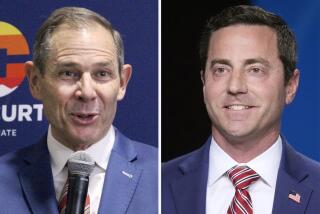McManus: Mitt Romney stays put
- Share via
If you’ve been holding your breath to see whether Mitt Romney would pivot to the center now that it’s a two-man race between him and President Obama, you can exhale; he won’t.
Romney made that clear in his victory speech after last week’s primaries in the Northeast. Instead, at least for now, the presumptive nominee’s campaign will focus relentlessly on what he sees as the president’s wrongheaded approach to the economy.
His message boils down to this: Obama favors government intervention in the economy, “a path where our lives will be ruled by bureaucrats and boards,” a path that “leads to chronic high unemployment, crushing debt and stagnant wages.” Romney, by contrast, stands for unfettered free enterprise and smaller government, for “free people, pursuing happiness in their own unique ways … [to] employ more and more Americans.”
COMMENTARY AND ANALYSIS: Presidential Election 2012
In other words, Romney, who earlier in the campaign described himself as “severely conservative,” hopes to win the White House by doubling down on that conservatism.
The Romney who claimed victory in five primaries last week wasn’t Moderate Mitt, heir to the Northeastern tradition of big-government conservatism; it was”tea party”Mitt, the ever-more-conservative Romney who endorsed the stringent House budget of Rep.Paul D. Ryan(R-Wis.).
In that sense, Romney’s speech confirmed something we already knew. Even though both candidates in this year’s presidential election were once described as moderates, this will be as polarized a battle as we’ve ever seen: between a minimum-government conservative who sounds increasingly like Ayn Rand and a newly unreconstructed liberal who sounds increasingly like Rachel Maddow.
There are three theories about why Romney isn’t pivoting to the center, and they’re probably all true. One is that after a career of changing positions, Romney simply can’t afford another flip-flop. A second is that presidential elections can’t be won only by swaying a tiny number of undecided voters in the center; victory requires mobilizing true believers in a brutal competition for turnout.
The third theory is the simplest: On economic issues, at least, Romney — a venture capitalist and free enterpriser to the core — has always been a true conservative.
If he could get away with it, Romney would talk about nothing but Obama’s failure to turn around the economy for the next six months. As Romney’s speechwriters put it in a zinger designed to give television producers a nice quick soundbite: “It’s still about the economy — and we’re not stupid.”
For partisan connoisseurs of negative campaigning, Romney’s speech offered plenty of red meat. “Four years ago, Barack Obama dazzled us in front of Greek columns with sweeping promises of hope and change,” he said. “But after we came down to earth…. Is it easier to make ends meet? … Do you pay less at the [gasoline] pump?”
And Romney didn’t stop the attack there. He signed onto the tea party’s portrayal of Obama as a secret socialist, with health insurance at the center of the plot. “With Obamacare fully installed,” he warned, “government will come to control half the economy, and we will have effectively ceased to be a free-enterprise society.” That’s right: Obamacare, which relies mostly on free-enterprise health insurance companies, is going to usher in Marxism’s red dawn. (The arithmetic’s a little dubious, though; to reach 50%, the Romneyites count all health expenditures, including private insurance and doctor bills, as “under federal control.”)
Obama’s failures have left Romney aching, he said, for the victims of the recession, including “every single mom” — no war on women here! — “who feels heartbroken when she has to explain to her kids that she needs to take a second job.”
But last week’s speech was thin on details about how he would lead the nation into what he called “a job-creating recovery,” and that will be his challenge in the coming months.
It’s true that the candidate spelled out details in a 59-point economic plan he unveiled in
Las Vegas way back in September. But most voters — heck, most campaign reporters — never read all 59 points. Republican strategists have been pleading with the Romney camp to digest the plan into five crisp bullet points.
With Obama’s approval rating still hovering just below 50%, the temptation for Romney will be to continue accentuating the negative — and hyper-conservative — for a while rather than laying out his vision. But eventually, he has to sell voters on what he’ll do.
That means he’s going to have to start running for president and not simply against Obama, as William Kristol, editor of the conservative Weekly Standard, put it. “Others can take care of making the anti-Obama case,” Kristol wrote. Romney “needs to make the case for his future presidency.”
If Romney takes his allies’ advice and gives voters a clear and positive message along with his red-meat, conservative rhetoric — and if the economy stays as sluggish as it looks now — he stands a decent chance of winning.
More to Read
Sign up for Essential California
The most important California stories and recommendations in your inbox every morning.
You may occasionally receive promotional content from the Los Angeles Times.











